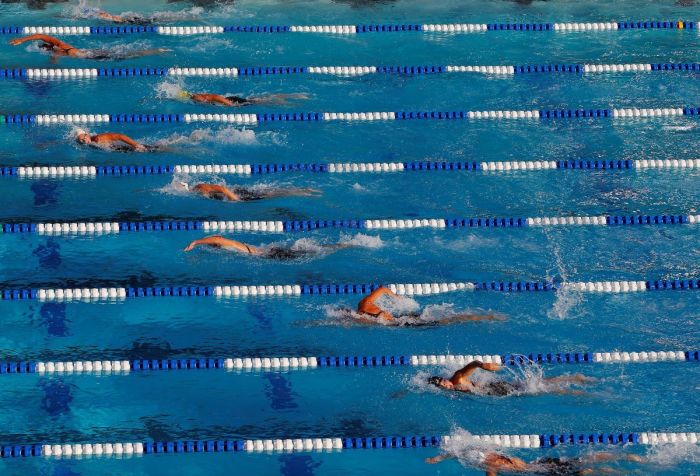
Texas Attorney General Ken Paxton has launched an investigation following reports that a male transgender-identified swimmer dominated a women’s swimming event last month.
Paxton announced Thursday his office will investigate U.S. Masters Swimming over potential violations of state law following reports that the organization allowed 47-year-old male Ana (Hugo) Caldas to compete in women’s events at the 2025 Spring Nationals swim meet held in San Antonio in April.
The probe seeks to uncover documents related to U.S. Masters Swimming and determine if the organization engaged in “false, deceptive, and misleading acts and practices,” Paxton said.
“The policy of US Masters Swimming, which allows men to compete in women’s events, is reprehensible and could violate Texas’s consumer protection laws,” said Paxton. “Not only is this policy insulting to female athletes, but it also demonstrates deep contempt for women and may violate Texas law. I will fight to stop these unfair policies and never back down from defending the integrity of women’s sports.”
Caldas, who also has a separate swimmer entry as Hugo Caldas on the USMS website, won five events in the women’s 45-49 age group at the 2025 USMS Spring National Championships held in San Antonio from April 24-27.
By allowing Caldas to compete in a women’s competition, USMS may have violated the Save Women’s Sports Act, a 2023 law prohibiting male athletes from competing in girls’ and women’s sporting events.
According to USMS policy, with a mission to “empower adults to improve their lives through swimming,” the private organization allows trans-identified swimmers to compete in the gender category they identify with.
Males who identify as female are eligible to compete in the female category as long as conditions are met. They must have undergone “hormonal therapy appropriate for the female gender” for no less than one year. The athletes must also provide documentation showing “testosterone serum levels regularly measured during the last twelve months that are below 5 nmol/L.”
Male trans-identified swimmers who don’t meet the requirements can participate in the female competitions, but their times will be “removed from the submitted results” and “are not eligible for official times, places, points, records, Top 10, or other forms of official recognition.”
Paxton’s investigation comes nearly a year after a failed legal challenge of eligibility requirements for males who identify as females to participate in women’s swimming.
Last June, a three-judge panel of the Court of Arbitration for Sport released its decision in the case of Lia Thomas v. World Aquatics. The decision centers on the efforts of Lia (Will) Thomas, a male athlete who has broke women’s swimming records and was an NCAA All-American in the women’s division after previously competing on the University of Pennsylvania’s men’s swimming team for three years.
Thomas challenged the eligibility requirements for participation in sporting events governed by World Aquatics.
World Aquatics is the global governing body for all aquatic sports, including the Summer Olympics. The body prohibits males who identify as female from competing in women’s races and created an “open” category that will allow trans-identified athletes to compete.
Earlier this year, three former female collegiate athletes — Grace Estabrook, Ellen Holmquist and Margot Kaczorowski — filed a lawsuit against the University of Pennsylvania after they were forced to compete with and share a locker room with Thomas.
Estabrook, Holmquist and Kaczorowski were Thomas’ teammates on the UPenn women’s swimming team.
“During their participation in their relays, both Estabrook and Kaczorowski felt shame for swimming with Thomas, recognizing that Thomas tainted the results of their swims and made the competition unfair for opponents,” the lawsuit states.


















